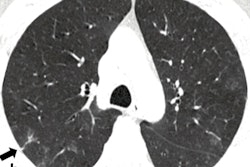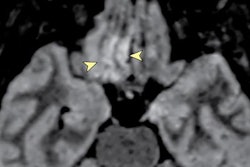
Dr. Jan Willem Kuiper, a radiologist at the Ikazia Hospital in Rotterdam, the Netherlands, has spoken about his experiences as a patient with COVID-19 and how the devastating illness has changed him. Also, a new U.K. study has found most COVID-19 patients should recover without having mental health problems.
"I'm used to making diagnoses and making people better," he told the regional broadcaster Rijnmond. "But suddenly you are on the other side of the line. You can only wait. ... You are powerless."
 Dr. Jan Willem Kuiper. Photo courtesy of Rijnmond.
Dr. Jan Willem Kuiper. Photo courtesy of Rijnmond.Kuiper, who was born in 1962 and trained as a radiologist at Erasmus MC in Rotterdam in the 1990s, thinks he was infected by his son while his son was visiting home from his shared student accommodation.
Not knowing how long he would be ill was very difficult to accept, according to Kuiper. After three days in the hospital, he craved a little human contact. He missed physical contact, such as a warm hug, most of all, as he lay in his hospital bed.
"There is nothing like a small pat on your head. I needed it, but you don't get that. I found it very difficult that you lie there alone," he said. "I find it completely nonsensical that we call this normal. Hopefully this is temporary abnormality."
Kuiper, whose areas of special interest are interventional and abdominal radiology, was finally allowed to leave the hospital after four days, and he now wants to use his experience to help patients in the same situation.
"I now look at patients in a different way. I want to give them a helping hand," noted Kuiper, who is now back at work and has already visited a patient with COVID-19 in the intensive care unit.
He described how he secretly took off his mask so that the patient could see his face -- because that was what he, as a patient with COVID-19, missed the most. Kuiper let the patient know that he too had been in a similar situation and knew what he was going through in terms of feeling lonely. He comforted the patient with words of encouragement and empathy.
"I said things like: 'I've had it too, you'll get through it, keep going!' Because I know what it's like to lie there. You feel very lonely," said Kuiper, who also works part-time as an advisor and mediator for a family law firm.
Potential mental health issues
Meanwhile, a study published on 18 May by Lancet Psychiatry confirmed that most COVID-19 patients should recover without experiencing mental illness, although the disease may cause delirium in a significant proportion of patients in the acute stage and clinicians should be aware of the possibility of depression, anxiety, fatigue, post-traumatic stress disorder (PTSD), and rarer neuropsychiatric syndromes in the longer term.
“Our analysis of more than 3,550 coronavirus cases suggests that most people will not suffer from mental health problems following coronavirus infection,” said Dr. Jonathan Rogers from University College London, U.K., who jointly led the research. “While there is little evidence to suggest that common mental illnesses beyond short-term delirium are a feature of COVID-19 infection, clinicians should monitor for the possibility that common mental disorders such as depression, anxiety, fatigue, and PTSD could arise in the weeks and months following recovery from severe infection, as has been seen with SARS and MERS.”
With few data yet for COVID-19, high quality, peer-reviewed research into psychiatric symptoms of patients infected with SARS-CoV-2 as well as investigations to mitigate these outcomes is needed, and monitoring for the development of symptoms should be a routine part of care, he added.
There are several reasons why severe coronavirus infections might have psychiatric consequences, including possible direct effects of viral infection (including on the central nervous system), the degree of physiological compromise (e.g., low blood oxygen), the immune response, and medical interventions, the authors wrote. Other reasons relate to the wider social impact, including social isolation, the psychological impact of a novel severe and potentially fatal illness, concerns about infecting others, and stigma.
Editor's Note: this report was based partly on an original article in Dutch by Esther Schalkwijk, published in Rijnmond on Wednesday, 13 May.



















